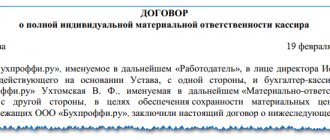Every legal entity and individual enters into contracts, and the process of their approval must be treated with the utmost care, especially for construction contracts. In the practice of Russian enterprises, construction contracts are found very often; under them, the construction of factories, residential buildings and power plants is ordered, roads and cars are repaired. During the implementation of the contract, many questions may arise, the answers to most of them can be easily found in the legislation.
This is the type of contractual relationship that the legislator is very careful about regulating. Those issues that are not reflected in the Civil Code are regulated in the emerging judicial practice and its generalization. Essential terms such as the term and price of the contract must be described in as much detail as possible, taking into account all the nuances and interpretations of the terms.
What do you need to know before drawing up a contract?
What is a contract?
Each enterprise, starting one or another project that it cannot complete on its own, faces the need to find a person who will take on the responsibility for solving these problems.
In order to regulate the responsibilities of the hired party when performing work that has a tangible result, it is necessary to conclude a contract. This type of obligation most often arises in construction, renovation, and when ordering scientific research.
Its essence is an agreement between the parties, one of them must perform the established and detailed work and provide its result to the second within a precisely defined period and for a fee, an agreement on the methods of determining which is also reached by the parties.
The procedure for concluding this type of contract does not differ from any other type of contract, but it is the construction contract that is most often concluded at auction. In this case, the one who wins the auction is already offered a standard form of contract approved by a government agency or board of directors, and it is impossible to make changes to it. This form, as a rule, contains all the conditions expressed in imperative, non-negotiable formulations.
Both legislation and arbitration courts proceed from the premises that an agreement will be perceived as concluded and entered into force only if its participants not only found a consensus, but correctly understood all the agreements they reached.
Necessary terms of the contract will be the type, volume of work and their result, deadline and price for the work, or options for its calculation, for example, tariffs or estimates.
Often the deadline requirements are very strict, so a firm definition of them is necessary. But courts often require absolutely accurate descriptions of deadlines for other types of contract work. Any vague wording or wording based on situations that may not occur may void the contract.
The cost of work is an important point.
Price is the cost of work, expressed in money, and it includes the price of time spent, taking into account the qualifications of workers, and materials, if payment is based on an estimate, or, sometimes, the monetary equivalent of the cost of its result, for example, a built house.
Contract agreement with an individual: sample 2019 for the provision of services
Last modified: June 2019
Carrying out work of a one-time nature, obtaining maximum material benefits with minimal costs encourage legal entities to enter into a contract with an individual. Registration of bilateral relations requires an individual approach when choosing an enterprise employee, a third-party individual or an individual entrepreneur as a contractor. The achieved tax optimization is “under the radar” of the inspection structures.
Deadlines. Their meaning
The contract must specify the terms.
An exact indication of the time when the result of the work must be transferred to the customer is a necessary condition of the contract agreement. This is the deadline for completing work, determined by the start date and the final date of completion.
The validity of the contract itself can be extended and determined in different ways, for example, until settlements are completed, and there are no strict requirements for this period.
What is essential for any entrepreneur who expects to get results at the right time is the deadline for the object to be ready. Failures can lead to adverse consequences and losses, not only for the customer, but also for his counterparties. Therefore, it is necessary to introduce into the agreement conditions establishing the contractor’s responsibility for failure to complete the work on time.
A term clause is considered established and agreed upon if it is described by some event or phenomenon that is not motivated by the decisions and desires of the parties. For example, it could be a date or the expiration of a certain period. A calendar date is a sufficient indication, but a condition that is described by periods after completion of the previous stage of work or payment periods indicates otherwise.
The term of the contract as an essential condition: new trends in judicial practice
Kirill Kondrashev,Legal Advisor
In accordance with Art. 432 of the Civil Code of the Russian Federation, the presence of an agreement between the parties on all essential terms of the contract, in addition to compliance with the form of the contract required by law, is a necessary attribute of the conclusion of the contract. At the same time, when resolving disputes regarding the conclusion of contracts, the practice of higher courts is focused, first of all, on preserving existing contractual relations between counterparties. This position is explained by the need to ensure the stability of civil circulation.
The Civil Code of the Russian Federation provides for various combinations of essential conditions for various types of contracts. However, the fundamental art. in this matter. 432 of the Civil Code of the Russian Federation allows us to identify several groups of essential conditions. The first group is the conditions regarding the actual subject of the contract. The second group is the conditions that the parties stated as essential. And the third group is the conditions that are named in the law or other legal acts as essential or necessary for contracts of this type. It is worth noting that there is no consensus in civil science regarding the last of the named groups of conditions. In particular, some scientists and practitioners believe that this group of conditions falls into two independent groups: essential conditions and necessary conditions. However, without delving into the reasons for the existence of these points of view, let’s move on to the analysis of judicial practice and see how the issue of essential conditions is resolved by the courts using the example of such an agreement as a work contract, and such an essential condition as a term.
In accordance with paragraph 1 of Art. 708 of the Civil Code of the Russian Federation, the contract indicates the initial and final deadlines for the work. Thus, from the literal interpretation of this norm, we can conclude that the deadline for completing the work is an essential condition of the contract. However, arbitration courts did not always adhere to this point of view.
For example, in the resolution of the Federal Antimonopoly Service of the North-Western District dated May 22, 2002 in case No. A56-32145/01 it is stated that “... The subject of the agreement between the plaintiff and the defendant is work on laying a pressure manifold. The cassation court believes that these works cannot be considered construction work, and the contract should be regarded as a contract agreement using Articles 702 - 729 of the Civil Code. The specified legal norms do not establish that the deadline for completing work is an essential condition for contracts of this type, therefore there are no grounds for recognizing the contract dated May 22, 2001 as not concluded...”
In the resolution of the Federal Antimonopoly Service of the North Caucasus District dated November 8, 2007 No. F08-7362/07 in case No. A32-28401/06-49/894, in which the court of Fr.
A similar conclusion is also contained in the resolution of the FAS North Caucasus District dated 08/09/2006 No. F08-3757/2006 in case No. A15-276/2006, the resolution of the FAS North Caucasus District dated 07/13/2006 No. F08-3038/2006 in case No. A15 -2031/2005.
Thus, in the opinion of the courts, in order to classify a period as an essential condition of a work contract, a direct indication of this is necessary in the relevant articles of the Civil Code of the Russian Federation.
After the Presidium of the Supreme Arbitration Court of the Russian Federation adopted Information Letter No. 127 dated November 25, 2008, the courts began to recognize the term as an essential condition of the work contract, since in paragraph 6 of the Information Letter it was noted that the work contract was not concluded due to the fact that the parties did not agree on the terms of the initial and deadlines for completing the work.
A similar position can be found in subsequent judicial acts. Thus, in the ruling of the Supreme Arbitration Court of the Russian Federation dated June 21, 2010 No. VAS-6393/10 in case No. A12-12230/2009 o.
In some cases, courts call the term an essential condition of the work contract, regardless of the reference to Art. 432 of the Civil Code of the Russian Federation. For example, in the ruling of the Supreme Arbitration Court of the Russian Federation dated May 30, 2012 No. VAS-6830/12 in case No. A04-1367/2011 it is stated: “...According to Article 702 of the Code, under a contract, one party (contractor) undertakes to perform, on the instructions of the other party (customer), a certain work and deliver its result to the customer, and the customer undertakes to accept the result of the work and pay for it. Article 708 of the Code stipulates that the work contract specifies the initial and final deadlines for the completion of work. Thus, the conditions regarding the subject and timing of the work are essential for this type of contract.”
A similar position can be found in the ruling of the Supreme Arbitration Court of the Russian Federation dated May 21, 2010 No. VAS-3386/10 in case No. A40-42502/09-137-396, the resolution of the Federal Antimonopoly Service of the Moscow District dated October 16, 2014 No. F05-11309/14 in case No. A40- 63336/13-109-378, resolution of the Federal Antimonopoly Service of the Moscow District dated 02/05/2014 No. F05-17195/2013 in case No. A40-54271/13-42-514.
As noted above, the contract must indicate the initial and final deadlines for the completion of the work, as stated in paragraph 1 of Art. 708 of the Civil Code of the Russian Federation. At the same time, by virtue of Art. 190 of the Civil Code of the Russian Federation, the period can be determined by a calendar date or the expiration of a period of time, which is calculated in years, months, weeks, days or hours, as well as an indication of an event that must inevitably occur. Therefore, when agreeing on the timing of work, specific calendar dates should be indicated. However, in practice this is not always possible for various reasons. For example, the parties made the start of work dependent on advance payment of these works by the customer or transfer of the construction site to the contractor.
In this regard, the question arose to what extent certain actions of the parties to the contract, which are associated with the start of work, can be attributed to events that must inevitably occur.
At the same time, for a long time, arbitration courts were guided by the explanations of the Supreme Arbitration Court of the Russian Federation contained in the Information Letter of the Presidium of the Supreme Arbitration Court of the Russian Federation dated January 11, 2002 No. 66 “Review of the practice of resolving disputes related to rent.” According to clause 4 of this Information Letter, the period can be determined by indicating only an event that does not depend on the will and actions of the parties.
So, for example, the Resolution of the Federal Antimonopoly Service of the Eastern Military District dated 06/03/2010 in case No. A43-22527/2009 states the following: “By virtue of Art. 190 and paragraph 1 of Art. 708 of the Civil Code of the Russian Federation, the condition of the contract on the period of completion of work is essential and is considered agreed upon if the period is determined by a calendar date or the expiration of a period of time, or an indication of an event that must inevitably occur. In the case under consideration, the deadline for completing the work in the contract is made dependent on payment for the work by the customer, that is, the circumstances of the occurrence of the deadline for completing the work do not have the quality of inevitability of occurrence, which does not allow us to consider the timing of the start of the work as agreed upon and, accordingly, the contract has been concluded. In the ruling of the Supreme Arbitration Court of the Russian Federation dated 06/07/2010 No. VAS-7051/10 in case No. A76-9817/2009-25-131 o.
At the same time, arbitration courts adhered to this point of view for a long time (resolution of the FAS Volga District dated October 11, 2011 in case No. A06-7880/2010, resolution of the FAS Northwestern District dated February 12, 2013 in case No. A56-41419/2011, resolution of the FAS North -Western District dated 09/03/2010 in case No. A56-47621/2009, resolution of the Federal Antimonopoly Service of the Ural District dated 08/18/2011 No. F09-5185/11 in case No. A60-41220/2010). Even despite the adoption by the Presidium of the Supreme Arbitration Court of the Russian Federation of May 18, 2010 No. 1404/10 in case No. A40-45987/09-125-283, in which the highest court indicated that the requirements of civil law on determining the period of performance of work under a work contract are essential the terms of this agreement are established in order to avoid uncertainty in the legal relations of the parties. If the initial moment of the period is determined by an indication of the action of the party or other persons, including at the time of payment of the advance, and such actions were completed within a reasonable time, the uncertainty in determining the period for the completion of work is eliminated. Therefore, in this case, the condition on the period of performance of work should be considered agreed upon, and the contract concluded.
The situation changed in 2014, when the Presidium of the Supreme Arbitration Court of the Russian Federation, in its Review of judicial practice on disputes related to the recognition of contracts as unconcluded, raised issues related to the coordination of the essential terms of a work contract (Information letter of the Presidium of the Supreme Arbitration Court of the Russian Federation dated February 25, 2014 No. 165). In particular, paragraph 6 of the Information Letter contains the conclusion that “if the initial moment of the period of performance of work by the contractor is determined by an indication of the actions of the customer or other persons, then it is assumed that such actions will be performed within the period stipulated by the contract, and in its absence - within a reasonable time.” term. In this case, the deadlines for completing the work are considered agreed upon.” As an example, a case is given in which a homeowners' association filed a claim with an arbitration court against a closed joint-stock company to collect a penalty for violating the deadlines for completing work under a work contract. The parties signed a contract with the condition that the work must be completed within a period of time calculated from the moment the plaintiff made the advance payment. The said payment was made within two weeks after signing the contract, and the work was completed by the defendant outside the mentioned period from the date of transfer of the advance payment.
The court of first instance rejected the claim, recognizing the contract as not concluded, guided by the fact that the parties made the initial and final deadlines for the completion of the work dependent on the payment of an advance by the customer and, therefore, by virtue of the provisions of Art. 190 of the Civil Code of the Russian Federation were not agreed upon.
However, the appellate court overturned the decision of the first instance court and upheld the claim, arguing that if the initial moment of the period of work performed by the contractor is determined by an indication of the actions of the customer or other persons, including at the time of payment of the advance, then it is assumed that such actions will be performed within the period stipulated by the contract, and in its absence - within a reasonable time. Consequently, in this case there is no uncertainty in the timing of the work. And an agreement containing such a condition on the period of performance of work must be considered concluded.
Also noteworthy is the situation described in paragraph 7 of this Information Letter. The entrepreneur filed a claim with the arbitration court against the limited liability company for the gratuitous elimination within a reasonable time of the deficiencies in the work performed by the defendant on the plaintiff’s land plot. In fact, the work was completed before an agreement was reached on the controversial terms. The plaintiff accepted and paid for them at the price offered by the defendant. But later it turned out that the work was done poorly.
The court of first instance rejected the claim, citing the fact that there was no contract between the parties and, therefore, the claim based on paragraph 1 of Article 723 of the Civil Code of the Russian Federation cannot be satisfied. Acceptance and payment for the work only indicate compensation by the plaintiff to the defendant for unjust enrichment according to the rules of Chapter 60 of the Civil Code of the Russian Federation, which does not provide for such a requirement as gratuitous elimination of defects in the work.
But the appellate court overturned the decision of the first instance court and satisfied the claim, based on the following. If there is a dispute about the conclusion of an agreement, the court must evaluate the circumstances of the case in their interrelation in favor of maintaining rather than canceling obligations, and also based on the presumption of reasonableness and good faith of participants in civil legal relations, enshrined in Article 10 of the Civil Code of the Russian Federation.
If the parties have not agreed on any condition of the contract related to the essential ones, but then, through joint actions to execute the contract and its acceptance, they have eliminated the need to agree on such a condition, then the contract is considered concluded. The court included the delivery of the result of work by the person who performed it in the absence of a contract, and its acceptance by the person for whom the work was performed, as such actions. Consequently, legal relations arose between the parties, regulated by the provisions of the contract.
It should be noted that this position of the Supreme Arbitration Court of the Russian Federation was confirmed in the judicial acts of the Supreme Court of the Russian Federation. Thus, in the ruling of the Supreme Court of the Russian Federation dated 02/03/2015 No. 52-KG14-1 it is stated that, when resolving the issue of the conclusion of an agreement, the court had to assess the circumstances of the case in their interrelation, taking into account the fact that if the parties did not agree on any term of the agreement , related to the essential ones, but then by their actions to execute the contract and its acceptance actually fulfilled such a condition, then the contract is considered concluded.
Thus, the deadline for completing the work is an essential condition of the work contract, which entails the non-conclusion of the work contract in the absence of a term clause. Despite the existing judicial practice, which quite broadly interprets the methods of determining deadlines in work contracts, the parties, when agreeing on the relevant conditions, are recommended, if possible, to determine the start and end dates of work by a calendar date. Because, as can be seen from this article, judicial practice can change quite dramatically.
Payment under the contract
The payment procedure is negotiated individually.
As already noted, the price must be determined, and determined as specifically as possible. It must be indicated in a fixed amount or a procedure for determining it must be established. The contract price must include the following elements:
- compensation of contractor costs;
- contractor's remuneration.
The contractor's costs are compensated for such as the cost of purchasing construction materials, wages of workers and related workers, and other costs, for example, electricity. If their compensation is not included in a separate item in the price structure, it is necessary to clarify how and on the basis of what documents compensation of these costs occurs.
Value added tax must also be reflected in the price line. It should be clear from the price formula whether it is paid, and if so, whether it is included in the full amount of the price or whether it is paid in addition to it, which should be indicated in the calculation formula.
The price may follow from the estimated cost of each type of work according to the tariff directory. Payment under a work contract, as a rule, is made in stages, either in the form of paying first an advance and then the main amount, or after agreeing and signing an acceptance certificate for one of the stages of work.
Signing the act is a prerequisite; without it, payment under the agreement may be challenged by the tax authorities.
If a newly created object is transferred to the customer, then an act of acceptance and transfer of property must also be signed.
Disputes about payment under a work contract quite often arise in situations where the customer does not sign the work acceptance certificates and does not pay for them. Such disputes may result in a requirement to correct defects or reduce the price.
Essential term of the contract
On the issue of the materiality of the terms of work completion for a construction contract, there are two positions of the courts, which were determined by lawyers:
- According to the first position, the timing of work is not an essential condition of the contract. Thus, the courts indicated that in Art. Art. 708, 740 of the Civil Code of the Russian Federation there is no direct indication that the deadline for completing work under a construction contract is an essential condition or a condition, the absence of which in the contract entails its non-conclusion (Resolution of the Federal Antimonopoly Service of the North Caucasus of 08.11.2007 N F08-7362/07 , dated 08/09/2006 N F08-3757/2006);
- Arbitration courts, including the Supreme Arbitration Court of the Russian Federation, consider the deadline for completing work to be an essential condition of the contract. At present, this issue has been resolved unambiguously. In particular, the following is indicated. Since in the disputed contract the parties did not agree on such an essential condition of the contract as the timing of the work, the court declared it not concluded in accordance with the provisions of paragraph 1 of Art. 432, paragraph 1, art. 708, paragraph 1, art. 740 of the Civil Code of the Russian Federation (Determination of the Supreme Arbitration Court of the Russian Federation dated November 15, 2010 N VAS-14659/10, Resolutions of the FAS VVO dated April 13, 2010 in case N A43-10122/2008, FAS VSO dated January 31, 2011 in case N A33-3902/2010, FAS ZSO dated 03/25/2010 in case No. A27-15556/2009, FAS MO dated 04/30/2010 No. KG-A40/3759-10).
Thus, the deadline for completing the work is an essential condition of the construction contract.
GPC agreement
A civil law agreement (or simply a civil law agreement) is often used in business transactions when formalizing relations with individuals. And it’s no secret that it is often used to optimize labor costs. Today, in a consultation about what a GPC agreement is, how GPC agreements are drawn up, how they differ from employment contracts, what needs to be written into the GPC agreement so that there are no claims from regulatory authorities, what taxes are paid under a GPC agreement. You will also receive a sample GPC agreement with an individual.
A civil law contract is an agreement concluded between an enterprise and an individual, under which the contractor (performer) undertakes to perform certain work (provide a certain service) on the customer’s instructions at his own risk. Relations under such agreements are regulated by Chapter 61 of the Civil Code. An alternative to this is an employment contract. In both cases, the employee or performer receives payment.
Types of GPC agreements
The most popular GPC agreements are:
- contract for the performance of work (it is also called a contract agreement, Article 837 of the Civil Code of Ukraine);
- contract for the provision of services (Article 901 of the Civil Code);
But these are actually not all types of GPC agreements. At their core, these are also:
- agency agreement (Chapter 68 of the Civil Code), since an individual must perform a certain task (provide a service) in the interests of the principal;
- contracts for the performance of research, development and technological work (Chapter 62 of the Civil Code), since such contracts can combine the performance of certain works and the provision of services;
- commission agreement (Chapter 69 of the Civil Code), since the subject of the agreement is also a service, for example, the preservation and sale of goods in the interests of the principal.
Encyclopedia of solutions
According to paragraph 1 of Art. 708 of the Civil Code of the Russian Federation, by agreement between the parties, the contract may stipulate, in addition to the initial and final deadlines for the completion of work, also deadlines for the completion of individual stages of work (interim deadlines). Moreover, the right to refuse to accept performance and demand compensation for losses (clause 2 of Art.
405 of the Civil Code of the Russian Federation) arises for the customer, among other things, if the performance has lost interest for him due to the contractor’s violation of the intermediate deadlines for completing the work provided for in the contract (clause 3 of Article 708 of the Civil Code of the Russian Federation). The validity of the customer's presentation of the relevant requirements is assessed based on the actual circumstances.
So, for example, a loss of interest in obtaining execution due to the contractor’s violation of intermediate deadlines for completing design work may be evidenced by the fact that the customer, who did not receive the next part of the documentation from the contractor on time, was forced, in order to comply with the construction schedule of the facility, to enter into an agreement for preparation of documentation with another contractor (resolution of the North-Western District AS dated 01.08.
2019 N F07-6209/16). At the same time, the mere fact of the contractor’s violation of the deadlines for completing the work (including if such a violation entails the impossibility of further financing the work) cannot be justified by the customer’s loss of interest in the execution (resolution of the First AAS dated December 3, 2015 N 01AP-7735/15, AS Volgo -Vyatka District dated July 15, 2015 N F01-2578/15, Eighth AAS dated May 12, 2015 N 08AP-3320/15).
What is the maximum period for which a contract is concluded?
The initial and final deadlines for the fulfillment of obligations are an integral part of any work contract, without the approval of which the document may be considered unconcluded. Lawyers of the Law Center “Lawyer Digin, Vorotnikov and Partners” have extensive practical experience in the field of supporting transactions under construction contracts, helping their clients make the most effective decision in this area.
Such an item as the start and end dates of work under a contract is significant regardless of who the transaction is concluded with: with an individual or with a legal entity.
However, the timing of the implementation of the contract acquires special significance in the case when the content of the document is the performance of work by a full-time employee. Neglect of precisely specified deadlines may attract the attention of regulatory authorities in order to reclassify the contract as a labor contract, which can provoke a number of negative financial and legal consequences for the customer.
The following conditions are taken into account regarding the deadlines for the completion of work:
- mandatory: initial and final deadlines for fulfilling contractual obligations;
- optional: intermediate dates corresponding to specific stages of work (especially relevant in the case of a construction contract).
According to the Civil Code of the Russian Federation, which regulates civil law relations, there are no time limits for a work contract. In other words, the law does not establish either a minimum or maximum duration of the relationship period from a work contract. Its duration is determined by the parties independently, based on the principle of compliance with the term of the contract and the volume of ordered services.
The terms of the agreement can be specified in the following format:
- calendar dates;
- time period;
- an indication of an event that is about to happen.
The main restriction concerns the re-conclusion of the contract for a new term, which is absolutely forbidden to do. This distinguishes a work contract from a fixed-term employment contract, which can be concluded several times with the same employee. The implementation of contractual obligations ends with an act of acceptance of work and payment for the result obtained, after which the contract is considered fulfilled.
Competent drafting of an effective work contract is an important component of the range of legal services to enterprises, which, due to their activities, often enter into contractual legal relations.
In matters of disputes arising from construction contracts, judicial practice is extremely contradictory, which means that it is more reliable to entrust an accurate description of the essential terms of the transaction, including the optimal time frame for the execution of work, to professionals.
An agreement drawn up by specialists from the Law Center “Lawyer Digin, Vorotnikov and Partners” will provide reliable protection for your business under any circumstances.
Under a contract concluded for the manufacture of a thing, the contractor transfers the rights to it to the customer.
Unless otherwise provided in the contract, the work is completely performed by the contractor - from his materials, with his forces and means.
Along with the general ones, the Civil Code of the Russian Federation establishes special rules for certain types of contract (household contract, construction contract, contract for design and survey work, contract work for state needs).
Contract has its roots in Roman law, but in modern business it is even more relevant and in demand than in Ancient Rome, and in many cases it is simply necessary, but we should not forget that when drawing it up, the closest attention should be paid to all its main elements , otherwise mistakes made may lead to its recognition as void.
Subject (object) of the contract The subject of the contract is specified in paragraph.
These may be: legal entities; individual entrepreneurs; just citizens (capable).
Types of contract: household; building; for design and survey work; contract for government needs.
We recommend reading: Russian Federation Criminal Code Article 306
Samples and forms of the contract: Household contract In a household contract, the contractor-entrepreneur performs work to satisfy the household or some other personal needs of the customer.
Using this decision as an example, we will consider the differences between labor and civil law relations.
The Strezhevsky City Court of the Tomsk Region considered the case based on the claim of M.
to the limited liability company “S” (hereinafter referred to as “C”) on the recognition of civil law relations on a contract as labor relations for an indefinite period and the collection of legal costs.
Competent drafting of an effective work contract is an important component of the range of legal services to enterprises, which, due to their activities, often enter into contractual legal relations. In matters of disputes arising from construction contracts, judicial practice is extremely contradictory, which means that it is more reliable to entrust an accurate description of the essential terms of the transaction, including the optimal timing of work completion, to professionals. An agreement drawn up by specialists from the Law Center “Lawyer Digin, Vorotnikov and Partners” will provide reliable protection for your business under any circumstances.








